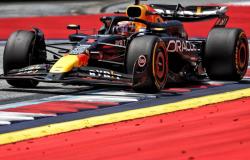A concept barely mentioned at the start of the last stage of the Giro. We were talking to Paolo Artuso, one of the Bora-Hansgrohe preparers, when the conversation took a curious turn. With equal health and not considering other external factors, it would be possible right now to declare the Tour podium. In fact, in the hardest stages, those with a really significant difference in altitude, the result is already written: the lighter athlete arrives at the final with a greater supply of glycogen, while the heavier one will run out of fuel sooner. You can eat more, study the necessary strategies, but if no one makes mistakes there is no way out.
«I’ll start by saying that I’m not a nutritionist – explains the Venetian – but the concept is quite simple. Theoretically, the athlete with the lowest body weight has an advantage over heavier cyclists. Wanting to make a comparison linked to the Giro, between Martinez and Thomas (second and third in the final ranking, ed.), the 8 kilos difference in favor of Martinez was an insurmountable wall for the Englishman. If you are lighter, day after day you expend a little less energy and therefore arrive at the final with more muscle glycogen, more fuel for the last hour of the race.”


So obvious?
It always depends on how the previous climbs are donebecause if they are done slowly, even those who weigh more will arrive at the final with greater energy.
Is this discussion good for very hard races? We saw that Van der Poel could have continued the Roubaix for another 60 kilometres, simply by avoiding over-revving and taking care to eat the right amount…
Uphill the wattages are higher than on the plain. But on the flats you go faster, in terms of pure speed. Why to last longer, you need to not go all out even on the flat, as was said about Van der Poel. Otherwise you risk expressing an exaggerated wattage, which however corresponds to a minimal difference in speed.
Can this difference in glycogen consumption be reduced by intervening on nutrition?
It’s obvious that this reasoning starts from the assumption that everyone starts in the right place, that is, with full tanks. So that everyone has done the correct carbohydrate load and consequently has maximum glycogen reserves. And then I start from the other assumption that everyone in the race eats correctly and without errors. Given these premises, those who weigh less consume less. Power is expressed in two ways, absolutely and relative to weight. Therefore the individual who weighs more is advantaged on an absolute level, the one who weighs less is advantaged on a relative level.




Do you mean that with the same health and nutrition conditions, having Pogacar, Vingegaard, Evenepoel and Roglic competing in the next Tour, you could already write the final ranking?
If there are no problems, yes! The only thing that escapes is the comparison between Evenepoel and the others. Remco won the Vuelta beating Mas and Ayuso, but never competed with the leaders of the class. I see him as very strong in one-day races: if you find him in Liège on a day, he’s unbeatable. So in my opinion, with equal conditions (therefore with the not at all obvious assumption that the Dane arrives at the start in ideal condition), the Tour ranking sees Vingegaard first, Pogacar second and Roglic third. This year Tadej seems to have lost weight compared to last year, you can tell at a glance.
Couldn’t he still win?
Be careful, there are variables. So in the end if the one who is a little heavier wants to win, you have to invent something. For example if there is a lot of time trialing or if the stage on the dirt road becomes more incisive: there are factors linked to ability that are not measurable.
You often meet athletes, what do they say about these very precise statistics?
They know they are accurate, but not infallible. Anyone can have the 20 minute crisis, even Vingegaard and Pogacar. Last year Tadej jumped halfway up the final climb to Courchevel, because perhaps weighing more, he had emptied the tank earlier. Or it had something to do with the fact that he had prepared the Tour in a month, due to the fracture in Liège, so he had been stuck for a long time and probably missed the final part of the preparation. Which this time could be Vingegaard’s turn.




It seems like bar chatter, what do we base ourselves on to move forward?
There is the whole part linked to energy expenditure: quite broad concepts, which seem theoretical, but are very important. How many grams of glycogen does someone who weighs 68 kilos have in their body compared to someone who weighs 60? It certainly has the largest tank, but we don’t know how many grams of glycogen it can contain. Usually when we have a top rider as an opponent we try to study him and then we decide how to work with our team. Of course, in the name of weight, you can’t start a diet too hastily. For better or worse they are all thin, it is difficult to intervene from the outside. So in the next Tour we will have to equip ourselves, taking advantage of the dirt stage and any other situation that could give us an advantage.











